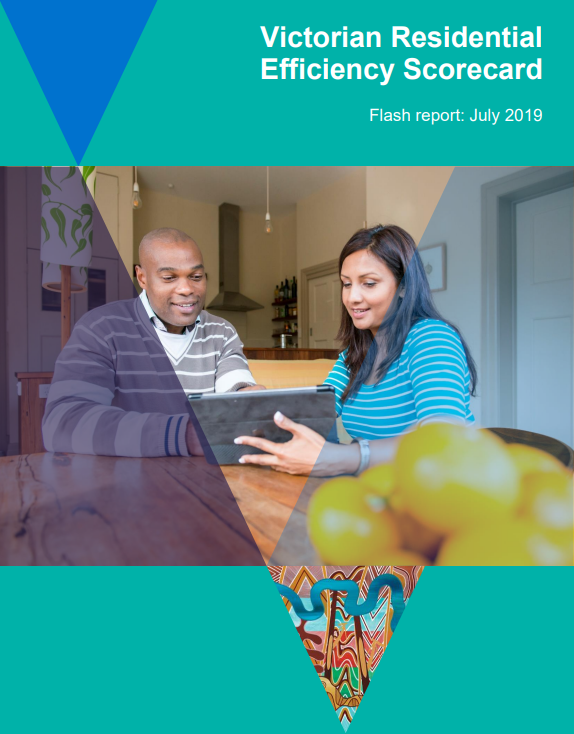On this page:
National Scorecard Initiative: 2023 Annual Report
The 2023 Annual Report documents delivery of the Scorecard program and highlights achievements from the 2022-23 financial year. These achievements include:
- a 43% increase in the number of Scorecard assessments outside of Victoria,
- a 28% increase in the number of accredited assessors across Australia, and
- the introduction of an all-electric feature for the Scorecard tool.
Scorecard has maintained high levels of benefit, quality and trust in all jurisdictions. The Scorecard team has continued working with the NatHERS Administrator towards accreditation of the Scorecard tool. Scorecard has maintained a focus on the ability of the program to scale-up.
To learn more, please download the full report: National Scorecard Initiative: 2023 Annual Report
To request an accessible version of this report, please contact the team: scorecard@deeca.vic.gov.au
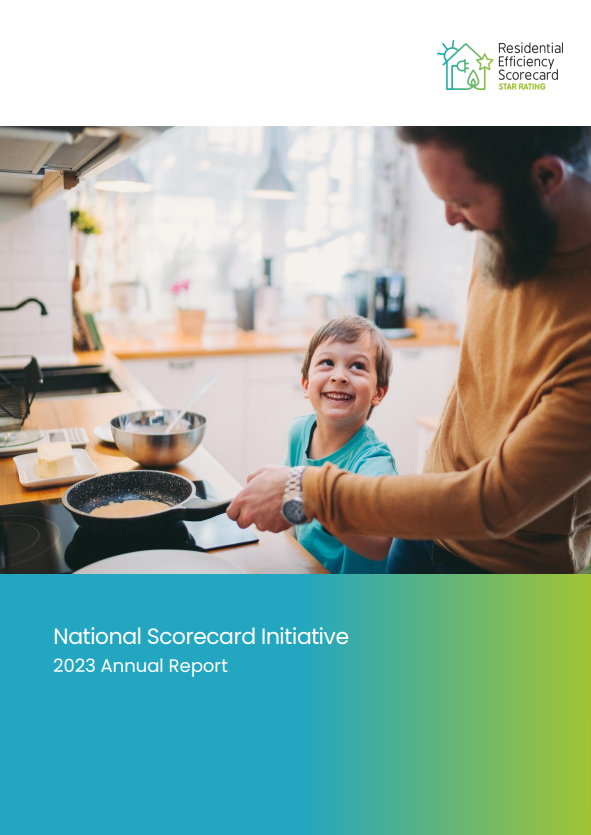
Improving the energy performance of homes in Australia
This report summarises key findings from three recent reports on energy efficiency in existing homes. The research found that improving a home’s energy performance leads to a range of benefits including:
- improved cost of living,
- improved health and comfort,
- reduced carbon emissions, and
- improved resilience to extreme weather.
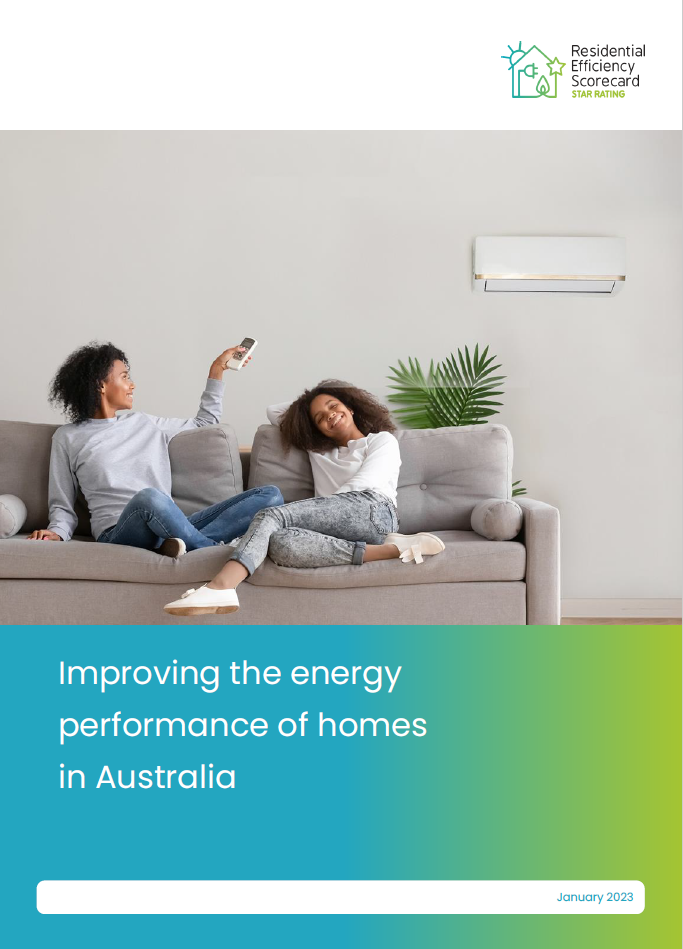
To achieve these benefits, home energy assessment programs must:
- prioritise householder trust,
- show they work by measuring outcomes,
- provide accurate information, and
- consider individual and community needs.
The reports referenced are: The Victorian Healthy Homes Program Research Findings: Sustainability Victoria, Learnings from the Energy Savvy Upgrades program for vulnerable households, and Optimising housing assessment to drive low carbon energy efficient housing upgrades: RMIT University. The Energy Savvy Upgrades and RMIT reports can be found on this page.
To learn more, please download the full report: Improving the energy performance of homes in Australia
RMIT University: Optimising housing assessment to drive low carbon energy efficient housing upgrades
This report by RMIT University analyses home energy assessment programs globally and provides recommendations for home energy assessments in Australia. The report identifies a lack of knowledge within Australia about energy efficiency and where to find reliable information.
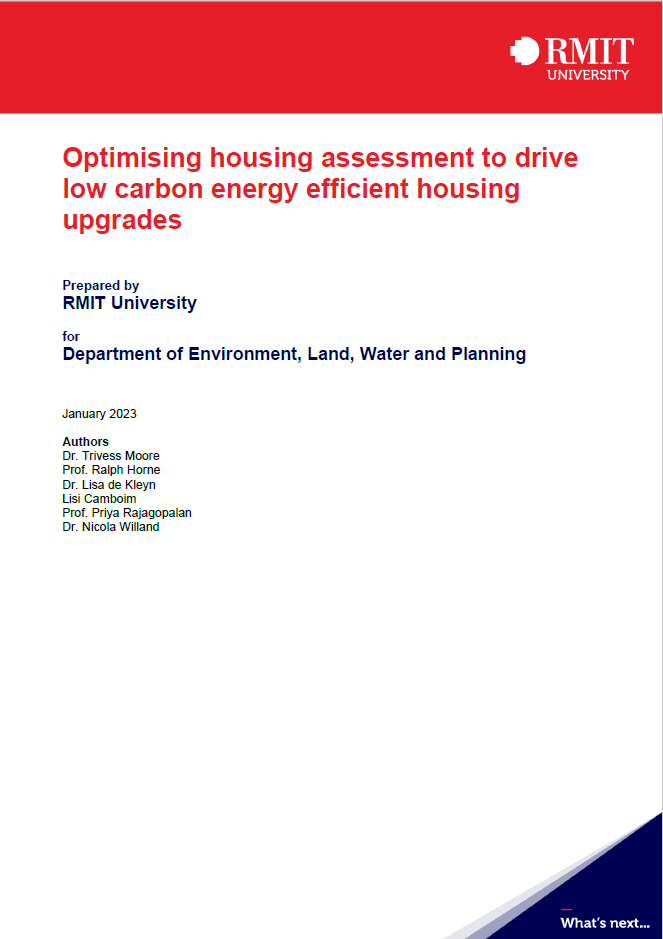
This means that home energy assessment programs have an important role to play in providing trusted information, helping upgrade existing homes and reducing greenhouse gases. Also included are chapters on: balancing costs, benefits and outcomes; criteria to analyse effectiveness, efficacy, and trust of assessment tools; and practical implications for design parameters.
The RMIT study proposed 4 design objectives for an optimised housing assessment for Australia:
- Assessments must be accurate, reliable and certified by an expert assessor.
- Assessments must be consistent, demonstrate integrity and have quality controls in place.
- Assessment results must be clear and easy to understand.
- Assessment tools must be transparent and regularly updated to adapt to change.
These design objectives were informed by 3 research approaches:
- a literature review of existing academic research,
- analysis of the energy performance of Australian homes, and
- a review of home energy assessment programs in Australia, Canada, Europe, the United Kingdom and the United States of America.
To learn more, please download the full report: Optimising housing assessment to drive low carbon energy efficient housing upgrades
Learnings from the Energy Savvy Upgrades program for vulnerable householders
The Energy Savvy Upgrades program was Phase Two of the Victorian Government's Affordable Retrofits program under the Energy Efficiency and Productivity Strategy. Energy Savvy Upgrades (ESU) delivered 792 Scorecard assessments, with 987 individual energy upgrades installed across 612 households. All upgrades were guided by the Scorecard Assessor's recommendations.
This program demonstrates best practice in reaching vulnerable households, while reducing upgrade and program management costs.
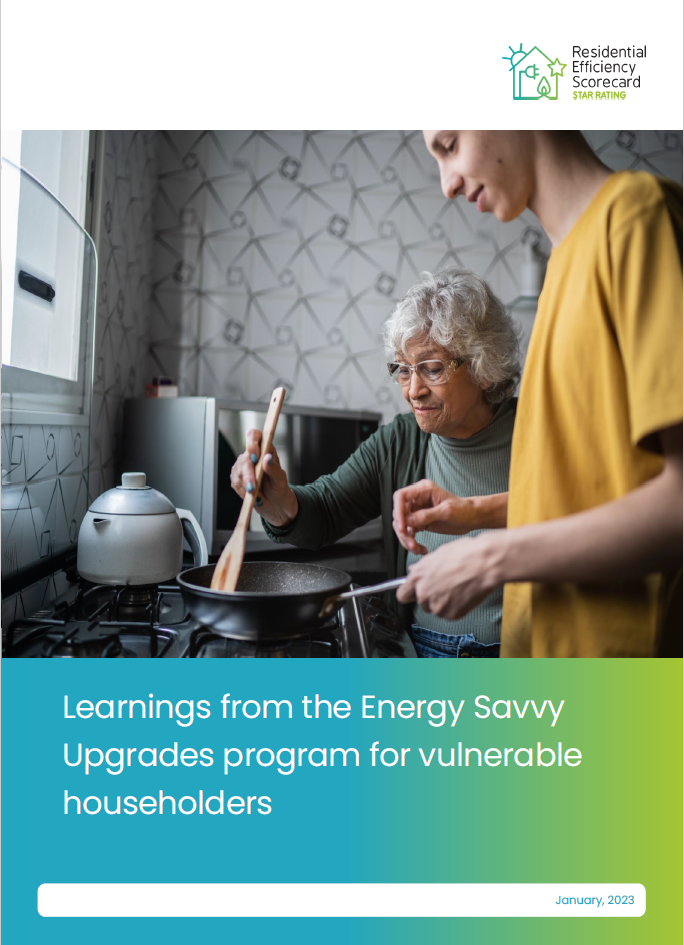
Key points from the Energy Savvy Upgrades report:
- Households reported a reduction in energy costs and an improvement in health and comfort. These outcomes were attained through use of the Residential Efficiency Scorecard and can be achieved at scale.
- The program achieved an average annual energy cost reduction of $550 per household after upgrades and a 21% reduction in energy consumption (program target was 10% reduction).
- ESU was successful in reaching a range of hard-to-reach sectors, including Indigenous Elders, culturally and linguistically diverse communities, and renters.
- 24% of assessed homes were rental properties, generating a 23% decrease in total energy consumption.
- Over 80% of householders experienced improved comfort and resilience to extreme weather.
- 19 different types of upgrades were implemented, indicating a single package of upgrades will not be suited, or of interest, to most householders.
- The program design and implementation was culturally safe, thanks to significant input from the Wadawurrung Traditional Owners and their support workers, leading to positive program uptake by First Nations households.
To support the planning and implementation of similar programs at any scale, this report includes clear information about program design, lessons learned and implementation recommendations. We welcome enquiries from governments and organisations interested in starting their own program using Scorecard: scorecard@deeca.vic.gov.au
A media release can be found on the Premier of Victoria's website.
To learn more, please download the full report:
Learnings from the Energy Savvy Upgrades program for vulnerable householders
National Scorecard Initiative: 2022 Annual Report
In August 2021, the multi-year National Scorecard Initiative was approved by the Energy Senior Officials Meeting and endorsed under the National Home Energy Rating Scheme.
This Annual Report for the 2021-22 financial year is Scorecard’s first under the Initiative, which runs from 2021-25. The report outlines performance against activities funded under the Initiative and documents the key achievements of the program in delivering a reputable tool, and associated Scorecard Assessor training and accreditation to improve the energy performance of existing homes across Australia.
To learn more, please download the full report: National Scorecard Initiative: 2022 Annual Report
Please contact the team to request an accessible version of this report: scorecard@deeca.vic.gov.au
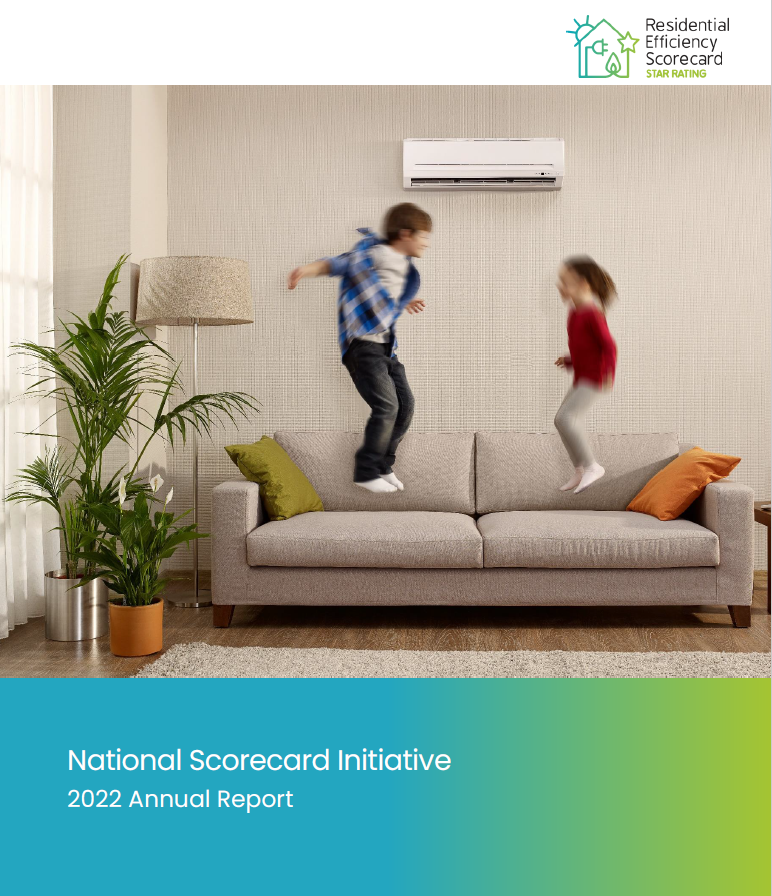
Scorecard National Field Trial Report
Between January and May 2021 the National Scorecard tool, training and accreditation process were tested across all states and territories. The success of the field trial underpinned the endorsement of Scorecard by the Nationwide House Energy Rating Scheme (NatHERS) and roll out of the National Scorecard Initiative from August 2021.
As part of the field trial participating householders were surveyed about their experience:
- 85% of respondents indicated that they would recommend Scorecard to their friends and family,
- 90% said that they understood more about energy efficiency in their home as a result of the assessment.
Scorecard National Field Trial Report
Please contact the team to request an accessible version of this report: scorecard@deeca.vic.gov.au
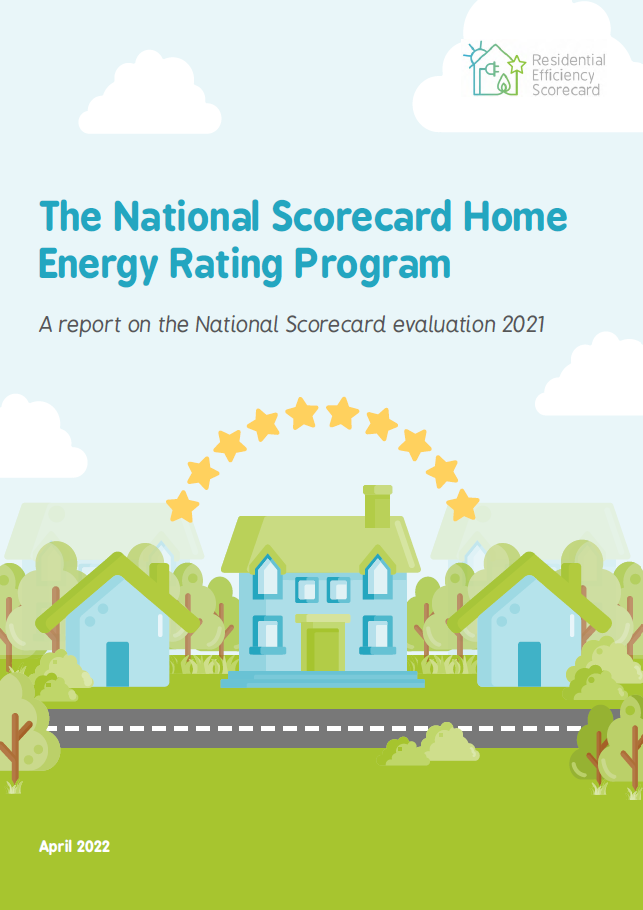
The Technical Basis for the Residential Efficiency Scorecard
This document by Tony Isaacs Consulting describes the purpose of the Residential Efficiency Scorecard tool, what it covers, why it covers these features and how it calculates a star rating, from a technical basis.
Technical Basis of the Residential Efficiency Scorecard
Technical Basis of the Residential Efficiency Scorecard (accessible Word version)
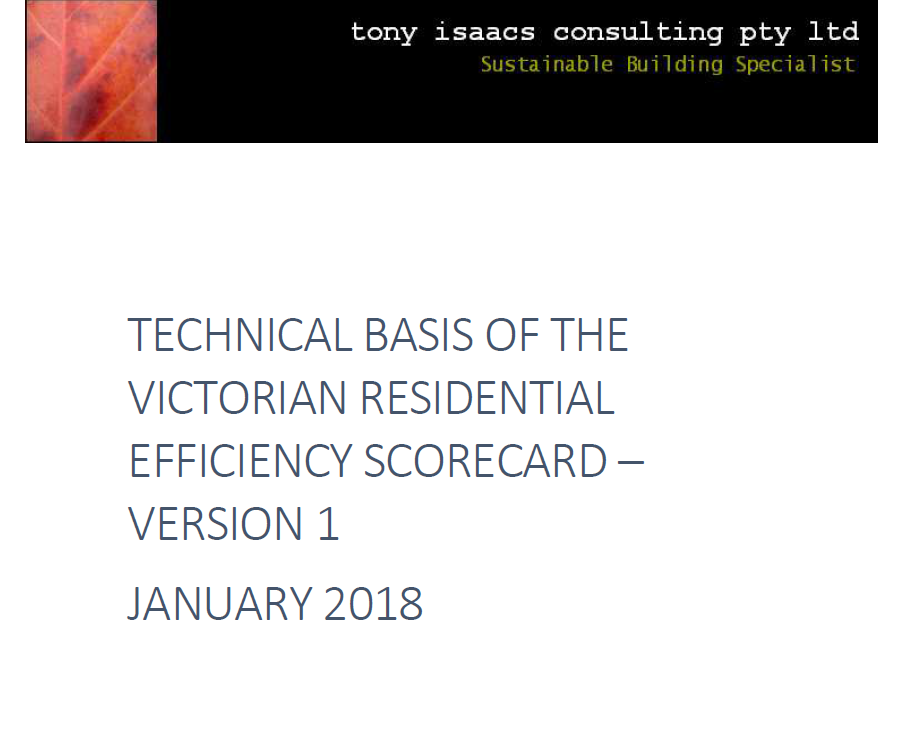
Victorian Residential Efficiency Scorecard: commercialisation opportunities
This paper by Point Advisory provides options and analysis that stakeholders could consider when developing business opportunities that involve the use of the Residential Efficiency Scorecard. Please note, this paper was published prior to Scorecard being released for commercial use.
Victorian Residential Efficiency Scorecard: commercialisation opportunities
Public background paper
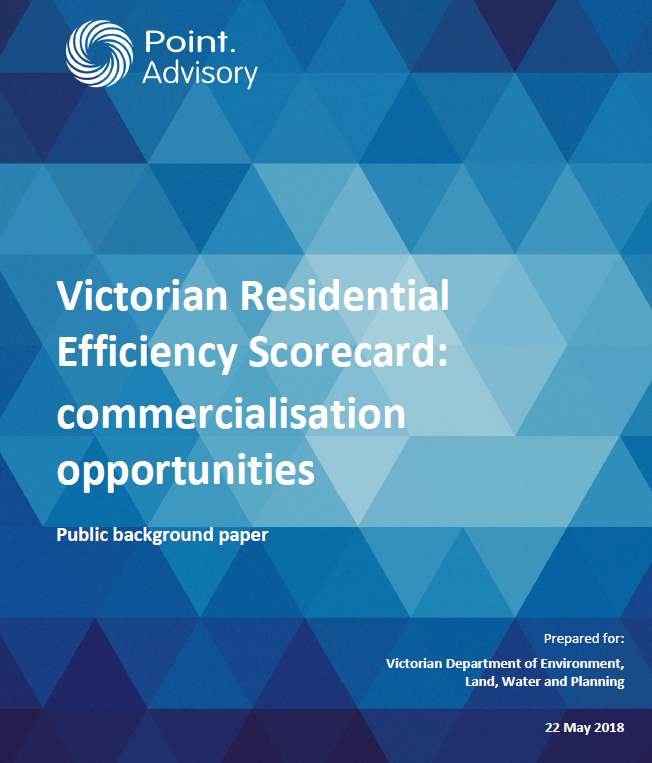
Scorecard Flash Report, 2019
The Scorecard programme produces one of the largest datasets of home energy cost and comfort in Victorian homes.
A report has been released with the first analysis of this data, including summaries of home performance, programme benefits and outcomes.
Page last updated: 01/08/24
